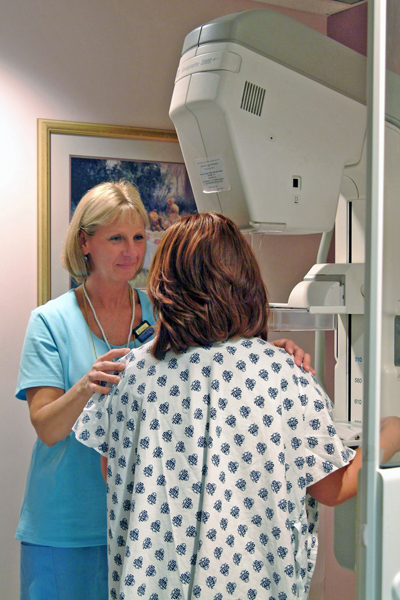Dense Breast Tissue May Increase Your Breast Cancer Risk

Digital mammography provides better visibility of the breast, particularly in women with dense breast tissue.
When it comes to the battle against breast cancer, understanding what may increase your risk is important. Certain genetic mutations and your ethnic background and family history may play a part in your likelihood of developing breast cancer. What you may not have known is that having dense breasts may also be a risk factor.
Breast density has nothing to do with the way your breasts look or feel. It’s a comparison of the amount of fatty tissue to other types of tissue present in your breasts.
“If you have dense breasts, it means you have less fatty tissue and more glandular tissue and stroma,” says Helen Leibowitz, M.D., one of Crozer Health ’s lead interpreting radiologists for mammography. “The glandular tissue is what makes and drains the milk your breasts produce, and the stroma is tissue that provides support.”
Research from the American Cancer Society shows that women who have dense breasts are four to five times more likely to develop breast cancer than women with lower breast density. In addition, dense breast tissue can make it harder to spot abnormalities on a mammogram.
Learning About Breast Density from Your Mammogram Results
“After you have a mammogram, a radiologist will examine the results and create a report for you and your doctor,” Leibowitz says. “Your doctor will help you understand the report and make recommendations based on the results.”
One of the results included in your mammogram will be an assessment of your breast density, which ranges from mostly fatty to extremely dense. Up to 50 percent of women in the United States have dense breasts.
“Many factors affect your breast density – including your age, weight and the medications you take,” Leibowitz says. “Dense breasts are very common.”
You’re more likely to have dense breasts if you are younger, premenopausal, or if you are undergoing hormone therapy to help relieve the symptoms of menopause.
What to Do If You Have Dense Breasts
“By no means is having dense breasts a reason to worry needlessly about your breast cancer risk,” Leibowitz says. “It simply means that, like all women, you should be vigilant for symptoms, get scheduled screenings, and be proactive about living a healthy lifestyle.”
The things you can do to ensure your health and minimize your risk include maintaining a healthy weight, eating nutritious food, exercising regularly, never smoking (or quitting if you do), and consuming alcohol in moderation if you drink.
Digital mammography, which creates images of your breasts digitally instead of using film, is the most accurate and effective screening tool. Fortunately, most mammogram machines in the United States are digital.
In addition to a digital mammogram, your doctor may recommend screening with an MRI or ultrasound if you have dense breasts.
“Knowing and understanding your breast density is another way for you to get a complete picture of your health and potential risk for cancer,” Leibowitz says. “Keep in mind that no one factor in your life—including your breast density—can predict your risk for breast cancer.”
